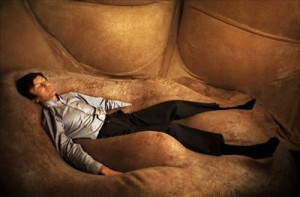STUDIO: Kino Lorber | DIRECTOR: Alain Resnais | CAST: Claude Rich, Olga Georges-Picot, Anouk Ferjac, Alain MacMoy, Vania Vilers
RELEASE DATE: 11/10/15 | PRICE: DVD $24.95, Blu-ray $29.95
BONUSES: audio interview with Alain Resnais, interview with Claude Rich, featurette about the collaboration of Alain Resnais and Jacques Sternberg
SPECS: NR | 94 min. | Foreign language science fiction romance | 1.66:1 widescreen | 2.0 stereo | French with English subtitles
Alain Resnais was obsessed with time and memory. These two concepts were chief themes of his work, from his landmark first feature Hiroshima mon Amour (1959) to his final two films, both touching and playful meditations on death (You Ain’t Seen Nothin’ Yet, The Life of Riley). This, his only sci-fi film, is (in Resnais’ own words) a “melancholy fantasy” that explores time and memory, and what remains in one’s mind after a relationship (and a partner) has died.
The DVD/Blu-ray release of this 1968 film represents the first time it has been readily available to American viewers, and while it may not be quite as classic a “new wave” sci-fi film as Godard’s Alphaville and Marker’s La Jetee, it is a gorgeously executed work that shows Resnais looking inward as the Sixties reached a fever pitch politically. Throughout the bulk of the film we are inside the protagonist’s mind, traveling backwards and forwards as he ponders a lost love.
Although the film’s “mosaic” structure makes it seem dense, the scenario is in fact quite simple. A writer (Claude Rich, All Together) who has survived a suicide attempt is recruited by scientists to take part in a time-travel experiment. The goal is to send him back in time for a minute, but the time machine (an oddly-shaped pod that looks like a brain) goes out of control, and the writer ends up bouncing from event to event in his own past, most of them involving his late, grievously depressed girlfriend (Olga Georges-Picot, Love and Death).
As the writer is drawn deeper and deeper into his time “loop,” we realize that Resnais and scripter Jacques Sternberg (a noted French sci-fi writer) are offering us a full, emotional portrait of a relationship, albeit with the pieces rearranged. The most impressive aspect of the film is that our hero spends a good deal of his past-time reliving mundane moments.
This focus on the instants between the seminal moments of a relationship is what makes Je t’aime so special — rather than focusing exclusively on deliriously happy, passionately angry, or lustful moments in a relationship, we understand how important the relationship was to our antihero (who actively sought to leave his girlfriend) by witnessing the calmer, more trivial moments the couple spent together.
Of course, the key to any good sci-fi story is crafting an imaginative take on the nature of reality, and so here as the writer gets more mired in moments from his past, he suddenly sees things he dreamt (a woman in a bathtub on a desk in his office, a man in a phone booth flooded with water) and things that relate to the experiment itself (the scientists recruiting him, their explanations of what should occur).
Resnais and Sternberg thus beautifully render our hero’s thought processes as they also explore his emotions and his fascination with the nature of time — at various points he describes how fast or slow events are moving in his life.
The three supplements included in this package do much to contextualize the film and “assemble” its plotline, for those who might have lingering questions. A 2007 audio interview with Resnais finds the filmmaker praising his screenwriter, saying that he valued Sternberg’s sense of humor most of all (a somewhat curious statement, given the sad tone of the film).
He also notes that the film only got made because Francois Truffaut told producer Mag Bodard that she had to get involved — interesting to ponder, given that Truffaut was making thoroughly conventional films at this time, unlike Resnais.
In a featurette about the collaboration between Resnais and Sternberg, critic Francois Thomas explains that the film was a highly personal project for Sternberg, who put a great deal of himself into the protagonist and modeled the depressed girlfriend after his wife. Thomas also lays bare Resnais’ technique by discussing the film’s 330 shots in terms of categories (the past, the present, the past with “dream material”). In the span of a few minutes Thomas does more to explore the structure of the film and its basic narrative than other commentators have done in feature-length audio commentaries.
The most emotionally charged nuggets of info about the film all appear in an interview with Claude Rich. He first reveals that the film was to be an experiment in POV (a la the first-person noir The Lady in the Lake) in which the viewer would see everything from his character’s perspective and he would not be seen onscreen, except in reflection. (Thankfully, Resnais scrapped that idea.)
Rich also discusses how the film was scheduled for a grand premiere at the Cannes Film Festival. It was 1968, however, and the festival was cancelled that year for political reasons. Rich notes that the left-wing Resnais was initially torn between his pride in the film and his feeling of solidarity for his fellow filmmakers (before the full cancellation, the festival was the scene of much mayhem, as various famous filmmakers pulled their films from competition).
The saddest, and yet most enlightening, thing Rich shares about the film is the fact that Resnais’ top choices for the female lead — an actress named Karen Blanguernon and Georges-Picot, who ultimately got the role and did a superb job — both committed suicide from depression. Discovering that the haunted female character in the film was incarnated by an actress who herself was haunted in her private life lends another level of resonance to this moving romantic fantasy.
|
Buy or Rent Je t’aime je t’aime
|
|||
|---|---|---|---|
 |
|||

Leave a Reply